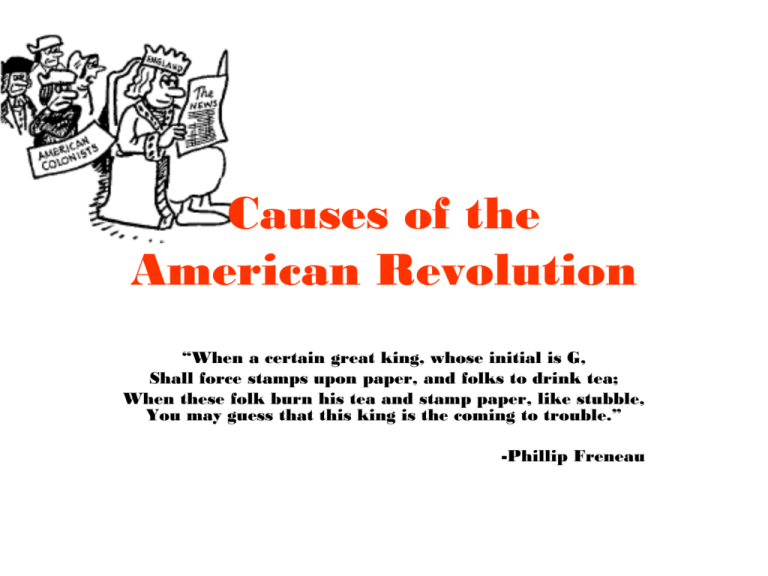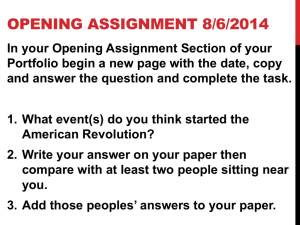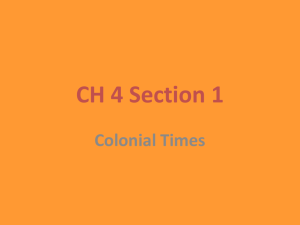Causes of the American Revolution
advertisement

Causes of the American Revolution “When a certain great king, whose initial is G, Shall force stamps upon paper, and folks to drink tea; When these folk burn his tea and stamp paper, like stubble, You may guess that this king is the coming to trouble.” -Phillip Freneau Homework • DUE TOMORROW-Write it down • You will create a poster to protest British actions against colonists. – Poster must explain: • Why are you angry? • Who are you angry with? • What do you want done about your problem? • What will you do if your problem is not resolved? – Picture – Key terms used correctly: • • • • No taxation without representation Repeal Tyranny boycott Example • • • • Klein Falcons are FED UP! KISD is a TYRANT! The students of Klein Intermediate are angry with the district over the unfair policy changes. – Students are being searched by teachers – Students are being charged extra for paper, lunch and other supplies. Did we give our consent to theses changes? No one asked us what WE THOUGHT! This is tyranny. No Taxation without Representation! • • The Student Council is demanding that the policies be repealed IMMEDIATELY. If not, we will stage a boycott of all district activities and we may even leave Klein and start our Own Independent School District! Project: Illustrated Timeline • • • • • Due Thursday, November 14. You will create an illustrated timeline of important events leading up to the American Revolution. You must begin with the Navigation Acts and end at the Declaration of Independence. Must include the year, brief explanation of the importance of the event and a visual. Format– – – – – – – Traditional timeline paper video Road map Powerpoint Animoto presentation Brochure 3-D- MOBLIE Navigation Acts 1650-1763 British Actionrestricted colonial trade, manufacturing and shipping. Colonial Reactionsmuggling, evasion, and disregard Essential Questions • How did the French and Indian War make the colonies ripe for change? • Which British policies in the colonies led to disagreement? • How did colonial protests against British policies escalate to armed conflict? French and Indian War aka Seven Year’s War 1754-1763 Cause: fought the French and Huron Indians over control of the Ohio River Valley. Effects: Britain left with huge debt; France lost almost all their territory in North America; Pontiac’s Rebellion led to the Proclamation of 1763. Review • What was the main cause of the French and Indian War? • What were the main effects of the British victory in the French and Indian War? Meanwhile in Britain… Back home… In 1763, North America was at peace. Only 12 years later, the colonists would again be at war. To understand the underlying causes of this new conflict, it is important to remember that the colonists had inherited the rights of “freeborn Englishmen” from the Magna Carta, the English Civil War, the Glorious Revolution, and the English Bill of Rights. In America, the colonists had also developed their own representative assemblies- such as the House of Burgesses and the General Court of Massachusetts. By 1763, the colonists were therefore already used to a large degree of self-government. After the British victory, the colonists felt safer and less in need of British protection without the French threat along their borders. At the same time, the colonists became involved in a series of new disputes with the British government. Proclamation of 1763 British ActionColonial Reactionprohibited colonial continued to move settlement beyond westward the Appalachian Mountains. One thing led to another… Sugar Act April 1764 British Action- taxed sugar from the West Indies British Reactionrepealed in 1766 RepealWrits of assistance- Colonial Reactionprotests led to lower taxes; Sam Adams organized protests in Boston. Taxation without Representation is tyranny. Influenced by John Locke • Government was a social contract • Purpose of government was to protect individual freedom and property. • If government failed to do this, its citizens had the right to overthrow it. Influenced by William Blackstone • Defined the rights of individuals in English law, as well as property rights that could not be violated, even by the king. Quartering Act May 1765 British Actionrequired certain colonies to provide food and housing (quartering) to British soldiers Colonial Reactionassemblies refused to comply Stamp Act November 1765 British Action- taxed almost all printed materials Colonial Reaction- held meetings, boycotted British goods, and even attacked British officials; Stamp Act Congress was held in New York City; produced petitions to state their position on these new taxes. British Reaction- repealed (cancelled) Stamp Act but issued the Declaratory Acts which allowed Parliament to make laws for the colonies in all cases whatsoever. Townshend Acts June 1767 British Action- taxed glass, lead, paper, and tea Colonial Reactionrallies; organized the Sons of Liberty; circulated pamphlets, newspapers, and political cartoons criticizing the new taxes; smuggling; resistance led to Boston Massacre; refused to import. What’s that? A Massacre!!! Boston Massacre 4000 Soldiers were sent to stop the protests and prevent further unrest. Their presence added to the growing bitterness. A group of people taunted the soldiers and threw snowballs. By accident, the soldiers fired and five colonists were killed, including Crispus Attucks. John Adams defended the soldiers and they were found to be innocent. Patriots circulated pictures and used this tragedy to win public support against the British. Paul Revere’s engraving of the Boston Massacre was circulate ted as propaganda to influence colonial opinions. Writs of Assistance A non-specific search warrant used to look for smuggled goods. Committees of Correspondence Formed by Sam Adams in 1772, with James Warren and his wife, Mercy Otis Warren; Organized opponents of British policies. Mercy wrote a series of pamphlets and satires against the British, wrote the first history of the American Revolutionary War using her notes from meetings and conversations, and convinced many people in the colonies to take up the Patriot cause. “Revolutionary Tea” There was an old lady lived over the sea And she was an island queen. Her daughter lived off in a far country With an ocean of water between. The old lady’s pockets were full of gold, But never contented was she. She called on her daughter to pay her a tax Of three-pence a pound on her tea, Of three-pence a pound on her tea. Tea Act May 1773 British ActionBritish East India Tea Company given a monopoly for colonial tea business with small tax Colonial Reactionships and 342 crates destroyed by colonists in Boston “Boston Tea Party” The amount of tea dumped into the harbor would make 24,000,000 cups of tea. Today, that much tea would cost about $1,000,000.00! Coercive Acts aka Intolerable Acts January 1774 British Action- did not allow Massachusetts Assembly to meet; no town meetings or jury trials; closed the port of Boston Colonial Reactionheld First Continental Congress to protest the acts and call for a complete boycott of British goods. Review • Civil disobedience is a refusal to obey a law we think is unjust. In what way was the Boston Tea Party an example of civil disobedience? Do you think this act of civil disobedience was justified? “What do we mean by the Revolution? The War? That was no part of the Revolution: it was only an effect and consequence of it. The Revolution was in the minds and hearts of the people, and this was effected from 1760-1775, in the course of fifteen years, before a drop of blood was shed…” -John Adams Create a Timeline On a legal sheet of paper, use the information in your notes to create a timeline of the important events leading to the American Revolution. Be Sure to Include: • • • • date (in chronological order) title British action and Colonial reaction colored illustration Now what? EXIT TICKETS: On an index card, Make a statement (lined side) and ask a question (blank side) about the information learned about the Causes of the American Revolution.







